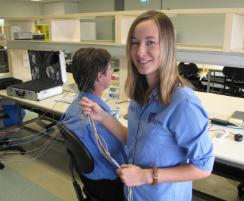Stephanie pioneers degree for vital members of medical teams
Published on 08 November, 2012
Biloela local Stephanie Lehmann is about to enter the third year of a degree program aimed at producing vital members of medical teams, those able to carry out clinical investigations...
Stephanie and other students pioneering this new degree will have the necessary skills, competence and knowledge to become part of multi-professional healthcare teams.

Stephanie Lehmann sets up for an EEG in the campus labs
CQUniversity's Bachelor of Medical Science (Specialisation) enables students to focus on Clinical Investigation, Pathology or Nutrition, either on campus in Rockhampton or via distance education.
In Stephanie's case, she is living on campus during term and in Biloela in term breaks.
"We are prepared to carry out diagnostics in areas including cardiac, neurophysiology, sleep science and respiratory science," she says.
"We are able to set up tests, interpret the data and decide if the results are valid before they go to the doctor for diagnosis."
Stephanie says one of the best features of the degree are the work-integrated learning placements in relevant work settings. In her case, these have included the Department of Thoracic Medicine at Royal Brisbane Hospital, clinical testing units at Rockhampton Base Hospital, and the Queensland Health clinics in Rockhampton.
"The placements really cement what we have been learning," she says.
Dr Geoff Bosson, from CQUniversity's School of Medical and Applied Sciences, says students learn to use a wide range of medical equipment including a spirometer for lung function and an EEG or electroencephalogram, which provides a graphic record of the electrical activity of the brain.
"We start them off with basic anatomy and physiology and then they progress to using specialised equipment and software," Dr Bosson says.
"Medical scientists are not confined to a laboratory but work with patients in a range of settings such as hospitals, clinics and private enterprise.
"Medical scientists are also involved with research and play a major role in exploring the effectiveness of new treatments."

